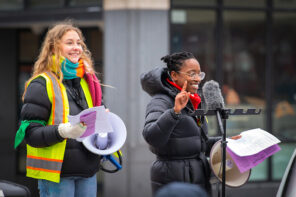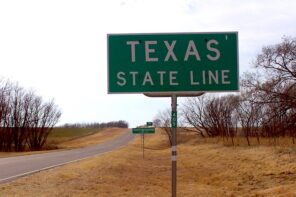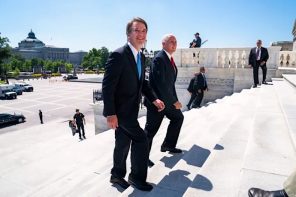It happens every year around this time: a public high school in a small town schedules a graduation prayer in plain violation of the 1992 Supreme Court case prohibiting such prayers, Lee v. Weisman; then a local student steps up to demand that the prayer be dropped and a moment of silence, or other invocation, be substituted. There is local outrage but the school board’s attorney recommends compliance to save litigation costs. In the end, the local community is fodder for sophisticated national ridicule. It’s the Scopes Monkey Trial all over again.
This year, that town was Bastrop, Louisiana, and the local atheist student was Damon Fowler, who emailed the superintendent of schools, pointing out the unconstitutionality of the traditional prayer. The prayer was dropped in favor of a moment of silence and predictably the local community was very upset by this action.
No one can criticize Fowler. It was courageous of him to stand up for his beliefs when he must have known how unpopular that would be. And he was of course correct that public high school graduation prayer had already been held unconstitutional by the Supreme Court.
But for the rest of us, especially those of us who support government neutrality toward religion, it’s time to reconsider the implications of the ban on prayer in public high schools. What did the Lee v. Weisman decision accomplish in Bastrop?
The ban tends to push prayer into the unofficial remarks of student speakers, which is what happened Friday at the Bastrop High School graduation ceremony; when graduating senior Laci Mae Mattice stood up to lead the planned moment of silence, she invited the audience to join her in the recitation of the Lord’s Prayer.
It cannot seriously be maintained that Mattice’s act was unconstitutional, since it was done in direct contravention of the school board’s direction. So, despite all the uproar and hard feelings, a prayer was said anyway.
Nor should supporters of the separation of church and state imagine that school officials should have tried to silence Mattice. How many professing Christian students dragged off graduation stages while calling out the name of Jesus do you think it would take before a constitutional amendment was introduced in Congress specifically protecting the right of public prayer? And such an amendment might well pass.
Even if prayer could be kept out of an invocation context, lower courts have split on the permissibility of prayers led by student graduation speakers. Some courts have considered such prayers protected private student speech, so Lee hasn’t even succeeded in banishing all legal prayer from high school graduation ceremonies.
But there are even more fundamental reasons to reconsider Lee. The substitution of moments of silence for prayer suggests that there’s no communal expression of meaning possible in American life, which is tantamount to the promotion of a kind of radical individualism. We are supposed to be a political community. Community requires some kind of creed—though not of course necessarily a religious creed. Silence is no substitute for communal expression, but some devotees of separation seem to feel that any communal expression of meaning is too close to religion to be permitted to the government.
In Justice Anthony Kennedy’s opinion in Lee, this dearth of communal meaning in the public square was admitted. Justice Kennedy wrote that the government could not undertake the task of prayer even to express “the shared conviction that there is an ethic and a morality which transcend human invention.”
But surely this goes too far. Even a New Atheist figure like Sam Harris, in his recent book, The Moral Landscape, insists that there is an objective morality that goes beyond human invention. But whatever the separation of church and state might mean, whatever government neutrality involves, it cannot forbid government from asserting that moral values are real. Just because this has been a traditionally religious position is no reason for secular people to give up on objective values.
For years, the community of non-believers, of which I am a part, and the community of liberal believers, who are, together, usually the ones attempting to ban religious imagery from the public square, have avoided the hard work of specifying what forms of communal expression of meaning are appropriate and constitutional at events like high school graduations. Instead, we’ve acted as if the category of “religion” were obvious and all that was needed for a constitutional challenge was a potential plaintiff who felt offended by the government’s language.
But the constitutional prohibition is not against offending people, it’s against establishing religion. Government offends people all the time. At the graduation ceremony in Bastrop, for example, the audience might have been asked to rise to honor our soldiers in Iraq and Afghanistan. Clearly, such a request could offend critics of those wars, yet the request would not be unconstitutional.
Only when offense is taken at the establishment of religion is there a constitutional violation. Once it is admitted that government expression of communal meaning is not the same as the establishment of religion—it is, in fact, a task entirely appropriate and traditional for government—it will not usually be obvious when prayer is permitted and when it is not.
Not even the presence of traditional religious language necessarily denotes religion as opposed to secular values. John Dewey, for example, even when he acknowledged that he was not a believer, didn’t give up the use of the word God. For Dewey, God symbolized the power of the ideal. For some non-believers today, such as the biologist Stuart Kauffman, God “is the very creativity in the universe.”
So the next time you hear about one of these disputes involving high school graduation prayers, don’t look down on the religious believers involved. Instead, ask yourself what symbols of community you want our polity to invoke. Ask yourself how we should express our hopes and dreams for our young people. And don’t be put off by the mere form of the expression.
If the government is indeed establishing religion, by all means, let us object. But let us also be sensitive and willing to compromise, understanding that the yearning for transcendent meaning is not confined to religious believers.




